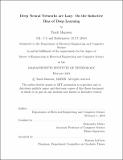| dc.contributor.advisor | Aleksander Madry. | en_US |
| dc.contributor.author | Mansour, Tarek,M. Eng.Massachusetts Institute of Technology. | en_US |
| dc.contributor.other | Massachusetts Institute of Technology. Department of Electrical Engineering and Computer Science. | en_US |
| dc.date.accessioned | 2019-07-15T20:33:32Z | |
| dc.date.available | 2019-07-15T20:33:32Z | |
| dc.date.copyright | 2019 | en_US |
| dc.date.issued | 2019 | en_US |
| dc.identifier.uri | https://hdl.handle.net/1721.1/121680 | |
| dc.description | This electronic version was submitted by the student author. The certified thesis is available in the Institute Archives and Special Collections. | en_US |
| dc.description | Thesis: M. Eng., Massachusetts Institute of Technology, Department of Electrical Engineering and Computer Science, 2019 | en_US |
| dc.description | Cataloged from student-submitted PDF version of thesis. | en_US |
| dc.description | Includes bibliographical references (pages 75-78). | en_US |
| dc.description.abstract | Deep learning models exhibit superior generalization performance despite being heavily overparametrized. Although widely observed in practice, there is currently very little theoretical backing for such a phenomena. In this thesis, we propose a step forward towards understanding generalization in deep learning. We present evidence that deep neural networks have an inherent inductive bias that makes them inclined to learn generalizable hypotheses and avoid memorization. In this respect, we propose results that suggest that the inductive bias stems from neural networks being lazy: they tend to learn simpler rules first. We also propose a definition of simplicity in deep learning based on the implicit priors ingrained in deep neural networks. | en_US |
| dc.description.statementofresponsibility | by Tarek Mansour. | en_US |
| dc.format.extent | 78 pages | en_US |
| dc.language.iso | eng | en_US |
| dc.publisher | Massachusetts Institute of Technology | en_US |
| dc.rights | MIT theses are protected by copyright. They may be viewed, downloaded, or printed from this source but further reproduction or distribution in any format is prohibited without written permission. | en_US |
| dc.rights.uri | http://dspace.mit.edu/handle/1721.1/7582 | en_US |
| dc.subject | Electrical Engineering and Computer Science. | en_US |
| dc.title | Deep neural networks are lazy : on the inductive bias of deep learning | en_US |
| dc.title.alternative | On the inductive bias of deep learning | en_US |
| dc.type | Thesis | en_US |
| dc.description.degree | M. Eng. | en_US |
| dc.contributor.department | Massachusetts Institute of Technology. Department of Electrical Engineering and Computer Science | en_US |
| dc.identifier.oclc | 1102057114 | en_US |
| dc.description.collection | M.Eng. Massachusetts Institute of Technology, Department of Electrical Engineering and Computer Science | en_US |
| dspace.imported | 2019-07-15T20:33:29Z | en_US |
| mit.thesis.degree | Master | en_US |
| mit.thesis.department | EECS | en_US |
